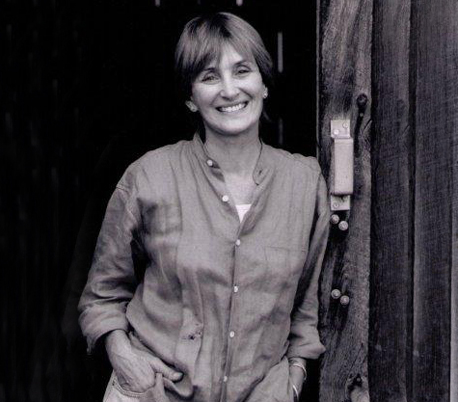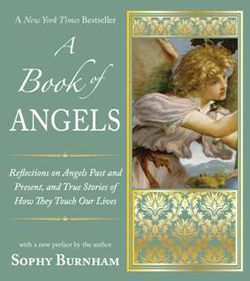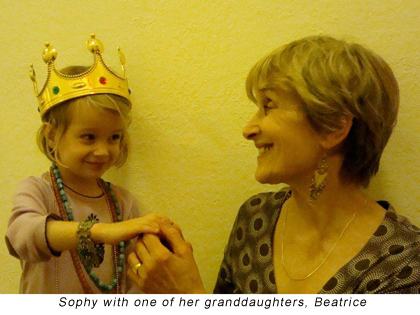
Location: Washington, DC
Age: 73
Marital Status: Single
Education: BA, Smith College
Thirty years ago, FOF Sophy Burnham was a successful writer with a loving husband, two beautiful daughters and the career she’d always wanted. She’d authored a best-selling book, The Art Scene, about corruption in the contemporary art world, and was writing for top publications including The New York Times Magazine, Esquire and Town & Country. “But every day I would look around and think, “Is this all there is?,” she remembers. “There was something very deeply missing.”
That’s when a “profound mystical experience” changed everything—her marriage, her career and her life’s focus. In 1990, A Book of Angels, her subsequent look at the “magical, mysterious, unexplainable” things that had happened in her own life, became a runaway bestseller, turning her into one of the foremost spiritual seekers and writers of our generation.
Here, she talks about the moment that changed her, and about her new book, The Art of Intuition, which she hopes will inspire every FOF woman to “desire to know and be more.”
Tell me about your life before A Book of Angels. Had you always been spiritual?
I grew up Episcopalian, but by my 40s, I didn’t identify with any religion. I was seeking for a number of years, but I wasn’t sure what I was looking for. I started meditating with an expert in Buddhist meditation then working with a Hindu guru. I did a lot of reading.
What changed?
Town & Country sent me on assignment to Peru. Everyone kept telling me I had to go to Machu Picchu. So I went, and, to make a long story short, I had a staggering mystical revelation and spiritual experience. When I came down from the mountain I could see light pouring off of all the trees, and people and grass and dogs. Light pouring off my hand and light everywhere. I felt I had seen the human soul.
Did you tell anyone?
For a long time, I couldn’t talk about it to anyone. I wrote down the experience as a record, but I didn’t know then that mystical experiences happen to people all the time. I’d never heard of that happening unless you were a saint—and I knew I wasn’t that!

So you pushed it under the rug?
I tried, but when I came back to Washington, DC, I was very different. I had healing power and I was very psychic and intuitive. And I knew my marriage was over. It was very frightening. We took about two exquisitely painful years to split up. But afterward, I could not write anything that did not have a spiritual dimension.
What happened with your marriage? Why was it over?
My marriage had been very strong—I was deeply in love with my husband, and he was deeply in love with me. We had two children. But there was something missing. Even these words that I’m using are words that I found afterwards. I would never have said, ‘yes, I want my marriage to split up.’ But I see now, many years later, that it was correct. It was good for me, because I needed that freedom to write things that I could not write if I was married. And it was good for him because he needed the support of a wife who shared his interests—and I no longer did.
Is that when you wrote A Book of Angels?
It was one of the books I wrote during that period. I wrote six books and couldn’t get any of them published. I thought, ‘I’m a failure; I can’t publish what anybody wants, and I don’t want to write what they want me to write.’ So I gave up writing. Of course, I discovered that I couldn’t get a normal job—I was totally unemployable.
Tell me about A Book of Angels—what’s it about? Why did you write it?
At that point I’d had so many experiences that I couldn’t explain—things that happened that didn’t make logical sense. I thought that I would just write down the stories without drawing any conclusions. And then I could turn them—like stones in my hand—and see what sense they made. Once I finished the book I thought, “woah, this book is about angels.”
Can you give me an example of one of the experiences?
The first story in the book concerns by daughter, Molly. When she was just a few weeks old, I put her on the bed and put pillows all around her so she wouldn’t fall while I went down the hall to work in my office. I was completely absorbed, typing away, when suddenly I thought, ‘Molly is falling off the bed!’ I raced down the hall and caught her in midair. I thought, ‘How could this be? What is protecting us?’
How did you eventually find a publisher?
As soon as I gave up on writing, suddenly success started coming to me. A small publisher found A Book of Angels and agreed to publish it. They printed just 5,000 copies, and there was no advertising budget or anything. But somehow people were finding it and buying ten and twelve copies at a time and giving it to their friends who gave it to their friends. It became a word-of-mouth bestseller, and the publisher could not keep it in print.
Why do you think it’s been so popular?
I got hundreds of letters from people saying they, too, had such experiences and never shared them with anyone, ‘Not even with my mother and not with my husband!’ They kept saying ‘Now I know I’m not crazy!’ I think the overarching message of all these experiences is the same: Don’t be afraid. We’re all taken care of and things are going according to a plan. All the stories are about being helped in times of trouble. It’s about how much we’re loved.

Tell me about your new book, The Art of Intuition.
If A Book of Angels is about a spiritual dimension that’s external to us, The Art of Intuition is about the flip side of the coin—what’s going on inside us. It’s about how we, as humans, are designations of divinity, and we have all of these abilities and power. I keep coming back to my understanding now of what Christ was saying: ‘Everything you’ve seen me do, you can do.’ And I’m sure that he taught his twelve disciples the secrets that we no longer have—the secrets we’re rediscovering now.
What do you say to people who doubt the existence of angels, intuition and God?
I myself have seen angels, but I still find myself, sometimes, in a doubting mood. Because doubting is a part of being human. But I can say, ‘here i am doubting’—without necessarily accepting that doubt as the truth. We are such complex beings. We have the gifts of logic and analysis and doubt. And on the other side, we have child-like acceptance and awe at the beauty and wonder of things. And we vacillate between these two points. When we’re in the awestruck mode, everything is perfect and we feel happy. When we are in the other mode, nothing is perfect and we are always striving.
What should we be doing to tap into our intuition?
Meditation is incredibly important. And prayer. And we have vastly wrong ideas about what it is to pray. It’s just thought and intention. One of the things that happens as you get older is you have the luxury of more time to explore these things. It used to be, people didn’t live past 45. They got married at 14 and were ancient by 22. In those periods where they did live longer, the wisdom of age was so mistrusted that older women were burned at the stake for being witches. We live in wonderful times that we can become spiritual women in our later years.
Is there an inevitable spiritual deepening that comes with being older?
I don’t think it’s inevitable at all. It takes effort and attention.
What do you want this latest book to do? What’s your wish?
That it touches the minds and hearts of people everywhere, and they are filled with potential and delight and healing and possibility. That it lifts us to our highest potential.

